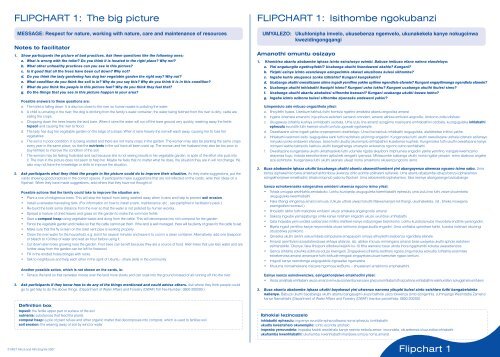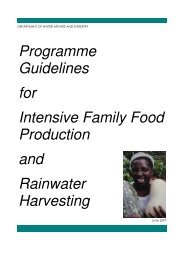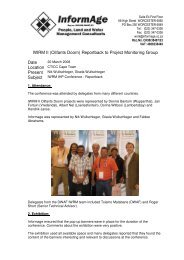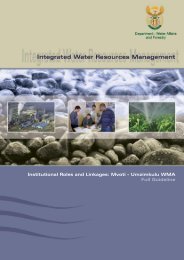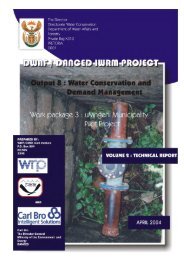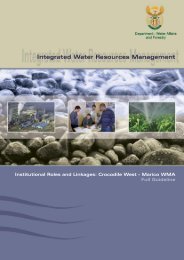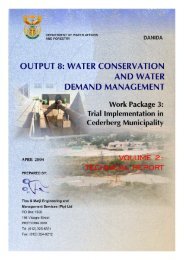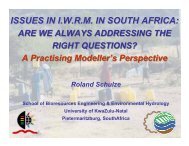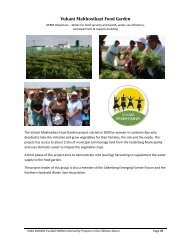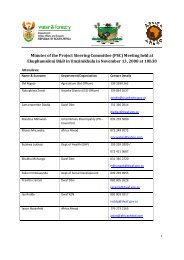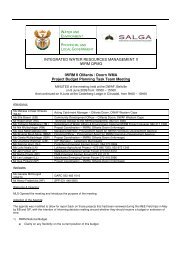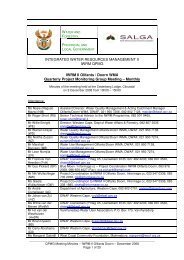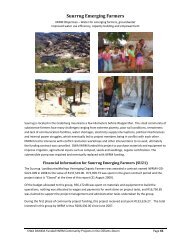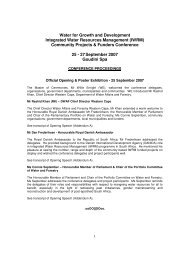Create successful ePaper yourself
Turn your PDF publications into a flip-book with our unique Google optimized e-Paper software.
FLIPCHART 1: The big picture<br />
FLIPCHART 1: Isithombe ngokubanzi<br />
Message: Respect for nature, working with nature, care and maintenance of resources<br />
Notes to facilitator<br />
1. Show participants the picture of bad practices. Ask them questions like the following ones:<br />
a. What is wrong with the toilet Do you think it is located in the right place Why not<br />
b. What other unhealthy practices can you see in this picture<br />
c. Is it good that all the trees have been cut down Why not<br />
d. Do you think the lady gardening has dug her vegetable garden the right way Why not<br />
e. What condition do you think the soil is in Why do you say this Why do you think it is in this condition<br />
f. What do you think the people in this picture feel Why do you think they feel that<br />
g. Do the things that you see in this picture happen in your area<br />
Possible answers to these questions are:<br />
a. The toilet is falling down. It is also too close to the river so human waste is polluting the water.<br />
b. A child is urinating in the river; the dog is drinking from the family’s water container; the water being fetched from the river is dirty; cattle are<br />
eating the crops.<br />
c. Chopping down the trees leaves the land bare. When it rains the water will run off the bare ground very quickly, washing away the fertile<br />
topsoil and causing the river to flood.<br />
d. The lady has dug her vegetable garden on the edge of a slope. When it rains heavily the soil will wash away, causing her to lose her<br />
vegetables.<br />
e. The soil is in poor condition. It is being eroded and there are not many crops in the garden. The woman may also be planting the same crops<br />
every year in the same place, so that the nutrients in the soil have all been used up. The woman and her husband may also be too poor to<br />
buy fertiliser to improve the condition of the soil.<br />
f. The woman may be feeling frustrated and sad because she is not seeing results in her vegetable garden, in spite of the effort she puts into<br />
it. The man in the picture does not seem to help her. Maybe he feels that no matter what he does, the situation they are in will not change. He<br />
also may not have the knowledge or skills to improve the situation.<br />
2. Ask participants what they think the people in the picture could do to improve their situation. As they make suggestions, put the<br />
cards showing good practices in the correct spaces. If participants make suggestions that are not reflected on the cards, write their ideas on a<br />
flipchart. When they have made suggestions, add others that they have not thought of.<br />
Possible actions that the family could take to improve the situation are:<br />
• Plant a row of indigenous trees. This will stop the topsoil from being washed away when it rains and help to prevent soil erosion.<br />
• Install a rainwater-harvesting tank. (For information on how to install a tank, maintenance, etc., see pamphlet in facilitator’s pack.)<br />
• Re-build the toilet some distance from the river so that the water is not polluted by human excreta.<br />
• Spread a mixture of dried leaves and grass on the garden to make the soil more fertile.<br />
• Start a compost heap using vegetable waste and dung from the cattle. This will decompose into rich compost for the garden.<br />
• Fence the vegetable garden and mielies so that the cattle cannot eat them. If the land is well managed, there will be plenty of grass for the cattle to eat.<br />
• Make sure that the fly screen on the toilet vent pipe is working properly.<br />
• Clean the river water for the household, e.g. boil it for several minutes and leave it to cool in a clean container. Alternatively, add one teaspoon<br />
of bleach to 10 litres of water and wait an hour before using it.<br />
• Cut down alien trees growing near the garden. Fruit trees can be left because they are a source of food. Alien trees that use less water and are<br />
further away from the garden can be left for firewood.<br />
• Fill in the eroded holes/dongas with rocks.<br />
• Talk to neighbours and help each other in the spirit of Ubuntu - share skills in the community.<br />
Another possible action, which is not shown on the cards, is:<br />
• Terrace the land so that rainwater moves over the land more slowly and can soak into the ground instead of all running off into the river.<br />
3. Ask participants if they know how to do any of the things mentioned and could advise others. Ask where they think people could<br />
go to get help to do the above things. (Department of Water Affairs and Forestry (DWAF) Toll free Number: 0800-200200.)<br />
Definition box<br />
topsoil: the fertile upper part or surface of the soil<br />
nutrients: substances that feed the plants<br />
compost heap: a pile of plant refuse and other organic matter that decomposes into compost, which is used to fertilise soil<br />
soil erosion: the wearing away of soil by wind or water<br />
Umyalezo: Ukuhlonipha imvelo, ukusebenza ngemvelo, ukunakekela kanye nokugcinwa<br />
kwezidingongqangi<br />
Amanothi omuntu osizayo<br />
1. Khombisa abantu ababambe iqhaza izinto ezinziwayo ezimbi. Babuze imibuzo efana nalena elandelayo:<br />
a. Yini engalungile ngethoyilethi Ucabanga ukuthi lisendaweni ekahle Kungani<br />
b. Yiziphi ezinye izinto ezenziwayo ezingezinhle okwazi ukuzibona kulesi sithombe<br />
c. Ingabe kuhle ukugenca zonke izihlahla Kungani kungekuhle<br />
d. Ucabanga ukuthi owesifazane olime ingadi yemifino yakhe uyilime ngendlela efanele Kungani engayilimanga ngendlela efanele<br />
e. Ucabanga ukuthi inhlabathi ikusiphi isimo Kungani usho lokhu Kungani ucabanga ukuthi ikulesi simo<br />
f. Ucabanga ukuthi abantu abakulesi sithombe bezwani Kungani ucabanga ukuthi bezwa lokho<br />
g. Ingabe izinto ozibona kulesi sithombe ziyenzeka endaweni yakini<br />
Izimpendulo zale mibuzo ongazithola yilezi:<br />
a. Ithoyilethi liyawa. Liseduze kakhulu futhi komfula ngakho amakaka abantu angcolisa amanzi.<br />
b. Ingane ichamela emanzini; inja iphuza esitsheni samanzi omndeni; amanzi akhiwa emfuleni angcolile; izinkomo zidla izitshalo.<br />
c. Ukugawula izihlahla kushiya umhlabathi usobala. Uma izulu lina amanzi azogijima masinyane emhlabathini osobala, kuzoguguleka inhlabathi<br />
ephezulu evundile futhi kwenze ukuthi umfula ugcwale ngokweqile.<br />
d. Owesifazane ulime ingadi yakhe onqenqemeni olwehlelayo. Uma lina kakhulu inhlabathi izoguguleka, alahlekelwe imifino yakhe.<br />
e. Inhlabathi isesimeni esibi. Iyaguguleka kanti futhi nezitshalo aziziningi engadini. Kungenzeka futhi ukuthi owesifazane utshala izitshalo ezifanayo<br />
minyaka yonke endaweni efanayo, bese kuthi ukudla okunempilo enhlabathini kusebenze kuphele. Kungenzeka futhi ukuthi owesifazane kanye<br />
nomyeni wakhe bampofu kakhulu ukuthi bangathenga umanyolo wokwenza ngcono isimo senhlabathi.<br />
f. Owesifazane kungenzeka ukuthi ukhathazekile futhi udumele ngoba akayiboni imiphumela engadini yakhe yemifino, nangale kwemizamo<br />
akayenza kuyo. Indoda esesithombeni ayibukeki sengathi iyamsiza. Mhlawumbe icabanga ukuthi noma ngabe yenzani, isimo abakuso angeke<br />
size sishintshe. Kungenzeka futhi ukuthi akanalo ulwazi noma amakhono okusenza ngcono isimo.<br />
2. Buza ababambe iqhaza ukuthi bacabanga ukuthi abantu abasesithombeni yini abangayenza ukwenza ngcono isimo sabo. Uma<br />
benza iziphakamiso beka amakhadi akhombisa ukwenza izinto ezinhle ezikhaleni ezifanele. Uma abantu ababambe iqhaza benza iziphakamiso<br />
ezingakhonjisiwe emakhadini, bhala imiqondo yabo ku-flipchart. Uma sebezenzile iziphakamiso, faka nezinye abangazange bazicabange.<br />
Izenzo ezinokwenzeka ezingenziwa umndeni ukwenza ngcono isimo yilezi:<br />
• Tshala umugqa wezihlahla zendabuko. Lokhu kuzoqeda ukuguguleka kwenhlabathi ephezulu uma izulu lina futhi zisize ukuvimbela<br />
ukuguguleka kwenhlabathi.<br />
• Faka ithangi elingenisa amanzi emvula. (Ukuze uthole ulwazi lokuthi lifakwa kanjani leli thangi, ukulinakekela, njll., bheka incwajana<br />
esemgodleni womsizi.)<br />
• Ithoyilethi lakhe futhi maliqhele emfuleni ukuze amakaka angangcolisi amanzi.<br />
• Sakaza ingxube yamaqabunga omile kanye notshani engadini ukuze uvundise umhlabathi.<br />
• Qala inqwaba yemvundela usebenzise imifino elahliwe kanye nobulongwe bezinkomo. Lokhu kuzobola kube imvundela enothile yasengadini.<br />
• Biyela ingadi yemifino kanye neyommbila ukuze izinkomo zingazukudla engadini. Uma umhlaba uphethwe kahle, kuzoba notshani obuningi<br />
obuzodliwa yizinkomo.<br />
• Qiniseka ukuthi isikrini sokuvimbela izimpukane emapayipini omoya ethoyilethi sisebenza ngendlela efanele.<br />
• Amanzi asemfuleni azosetshenziswa ekhaya ahlanze, isb. abilise imizuzu eminingana amanzi bese uwayeka ukuthi aphole esitsheni<br />
esihlanzekile. Okunye, faka ithisipuni elilodwa lwejikhi ku-10 litha wamanzi bese ulinda ihora ngaphambi kokuba uwasebenzise.<br />
• Genca izihlahla zokufika ezikhula eduze kwengadi. Zingayekwa izihlahla zezithelo ngoba zingumsuka wokudla. Izihlahla ezizimilele<br />
ezisebenzisa amanzi amancane futhi ezikude nengadi zingayekwa ukuze kwenziwe ngazo izinkuni.<br />
• Imigodi kanye nezindonga ezigugulekile zigcwalise ngamatshe.<br />
• Khuluma nomakhelwane nisizane ngomoya woBuntu – shiyelanani amakhono emphakathini.<br />
Esinye isenzo esinokwenziwa, esingakhonjisiwe emakhadini yilesi:<br />
• Yenza amathala emhlabeni ukuze amanzi emvula ezohamba kancane phezu komhlaba futhi azoshona enhlabathini esikhundleni sokugijimela emfuleni.<br />
3. Buza abantu ababambe iqhaza ukuthi bayakwazi yini ukwenza nanoma yikuphi kulezi zinto ezishiwo futhi bangabeluleka<br />
nabanye. Babuze ukuthi bacabanga ukuthi abantu bangayaphi ukuze bathole usizo lokwenza izinto ezingenhla. (Umnyango Wezindaba Zamanzi<br />
kanye Namahlathi (Department of Water Affairs and Forestry (DWAF) Inamba yamahhala: 0800-200200.<br />
Ibhokisi lezincazelo<br />
inhlabathi ephezulu: ingxenye evundile ephezudlwana noma iphezulu lomhlabathi<br />
ukudla kwezitshalo okunempilo: izinto ezondla izitshalo<br />
inqwaba yemvundela: inqwaba kadoti wezitshalo kanye nezinto ezibola zenze imvundela, okusebenza ukuvundisa inhlabathi<br />
ukuhamba kwenhlabathi: ukuhamba kwenhlabathi ihanjiswa umoya noma amanzi<br />
© MiET Africa and Africa!Ignite 2007<br />
<strong>Flipchart</strong> 1


